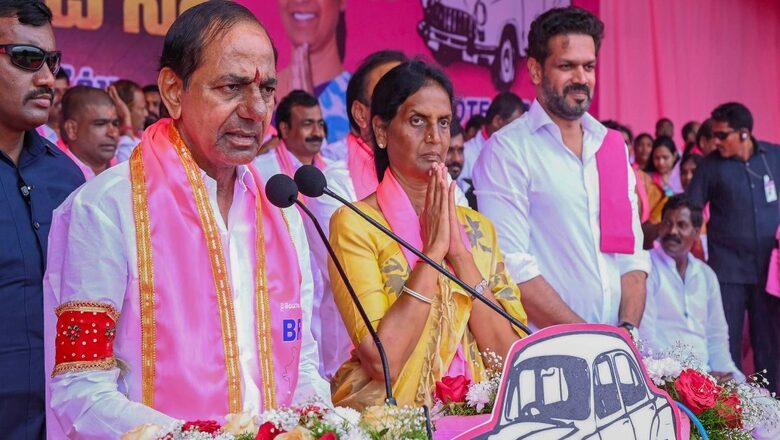
views
The Bharat Rashtra Samithi (BRS) is in a closely contested electoral fight with the Congress in Telangana, wherein if the incumbent wins, it would be a record in any southern state as no party since 1980 has won elections thrice consecutively.
In fact, until a couple of months ago, elections seemed a one-way affair for the incumbent BRS for three reasons: the absence of any state-level leader in other political parties who could match the stature of Chief Minister K Chandrashekar Rao (KCR); the division of anti-BRS votes among the Congress and the BJP; and the popular policy outreach by the government in both, rural and metropolitan areas.
However, a series of events outside the fold of the incumbent party helped the Congress emerge as a challenger closer to the elections, despite their organisational weakness. First, the BJP’s decision to replace its popular leader, Bandi Sanjay Kumar, as state party president with G. Kishan Reddy, boomeranged. The saffron party lost the plot of emerging as a prime challenger, leading to the Congress emerging as the default beneficiary of the consolidation of anti-BRS votes. This explains why suddenly, a pro-Congress narrative emerged as a persuasive discourse in the last two months. In fact, many pollsters and agents of civil society who are flocking to the Congress recently, started predicting a landslide victory, sort of a tsunami, for the Congress.
Nevertheless, a visit to the ground revealed a complicated picture wherein the election at this moment is too close to call. Not only the ruling BRS is very much in the game, but rather, has a distinct advantage in specific regions and segments of the state. For instance, the party still has the advantage of the leading face. The incumbent Chief Minister, K. Chandrashekar Rao, still holds charisma for a significant section of the electorates across the state even if it has waned to some extent.
Two, his son, K.T. Rama Rao (KTR) has emerged as the new face of Telangana’s growth story which has made him a darling of the corporate sector, IT professionals and a vast segment of youths who crave the politics of aspiration. This effectively neutralises the anger of youths stuck to the charm of securing government jobs. The aspirational youths in Hyderabad metropolitan regions vouch for the emergence of the city as the most sought-after IT Hub which has already surpassed Bangalore and Pune.
Similarly, every district has IT Parks which are emerging as the new developmental model with greater social inclusivity, albeit in an enabling paradigm which facilitates people’s aspirations rather than merely offering politics of sustenance via a series of welfare schemes. It is this enabling paradigm of development and growth that departs the incumbent party away from its prime challenger, the Congress party, which relies on being the default beneficiary of anti-BRS votes.
Three, while the Congress is seemingly in close contest in southern and eastern regions like Nalgonda, Warangal, Khammam, Wanaparthy, Mahabubnagar etc, in the north and Hyderabad region, the BRS has a slight to decisive edge.
Further, contrary to the perception and pro-Congress narrative, AIMIM and Asaduddin Owaisi are still holding their turf of Old Hyderabad and seven assembly seats therein. Owaisi’s unflinching support to the BRS is an additional factor helping the incumbent in their third electoral battle.
True, there is anti-incumbency among poor peasants, youths seeking government jobs and caste and community in Hyderabad areas adjoining Andhra who are settled in Telangana but have roots in Andhra too. They are vouching for the Congress quite vocally. But the anti-incumbency is not of the kind which cannot be managed. In fact, a significant section of pro-Congress voters agreed that the BRS government has delivered benefits on the ground and preferred to vote for the challenger simply on the ground that other parties should also get a chance for the sake of change.
In this context, the ensuing election for the BRS is about passing the litmus test of southern India in the last four and a half decades wherein no party won the election thrice in continuity. Winning this election would signify the party as the most powerful regional player, south of Vindhyas, which would keep alive the possibility of the proverbial third front away from the attempted duel between INDIA and NDA.
However, if Congress loses Telangana, its aim to link the electoral victories in southern states to the Bharat Jodo Yatra will be frustrated and the party’s attempt to acquire more bargaining leverage will be severely affected.
Hence, the Telangana election matters for 2024, but the resilience of the incumbent BRS matters more.
Sajjan Kumar is associated with PRACCIS, a Delhi-based research institution. Views expressed in the above piece are personal and solely that of the author. They do not necessarily reflect News18’s views.













Comments
0 comment